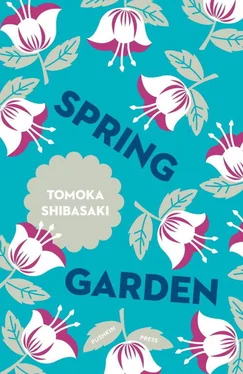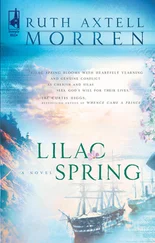Tomoka Shibasaki - Spring Garden
Здесь есть возможность читать онлайн «Tomoka Shibasaki - Spring Garden» весь текст электронной книги совершенно бесплатно (целиком полную версию без сокращений). В некоторых случаях можно слушать аудио, скачать через торрент в формате fb2 и присутствует краткое содержание. Город: London, Год выпуска: 2017, ISBN: 2017, Издательство: Pushkin Press, Жанр: Современная проза, на английском языке. Описание произведения, (предисловие) а так же отзывы посетителей доступны на портале библиотеки ЛибКат.
- Название:Spring Garden
- Автор:
- Издательство:Pushkin Press
- Жанр:
- Год:2017
- Город:London
- ISBN:978-1-78227-273-1
- Рейтинг книги:4 / 5. Голосов: 1
-
Избранное:Добавить в избранное
- Отзывы:
-
Ваша оценка:
- 80
- 1
- 2
- 3
- 4
- 5
Spring Garden: краткое содержание, описание и аннотация
Предлагаем к чтению аннотацию, описание, краткое содержание или предисловие (зависит от того, что написал сам автор книги «Spring Garden»). Если вы не нашли необходимую информацию о книге — напишите в комментариях, мы постараемся отыскать её.
Spring Garden — читать онлайн бесплатно полную книгу (весь текст) целиком
Ниже представлен текст книги, разбитый по страницам. Система сохранения места последней прочитанной страницы, позволяет с удобством читать онлайн бесплатно книгу «Spring Garden», без необходимости каждый раз заново искать на чём Вы остановились. Поставьте закладку, и сможете в любой момент перейти на страницу, на которой закончили чтение.
Интервал:
Закладка:
“The fact that he has to go through something like this when he’s so young…” she said, and her eyes welled up with tears. Nishi listened to what Miwako had to say, then talked about her own symptoms and experiences in the hope that it might be of some use. When she explained that asthma often went away as children got older, and that she’d stopped having attacks by the time she started high school, Miwako nodded firmly and said, “I know it’s important that I stay strong through all of this. It’s him that’s suffering, after all, not me.”
Just then they heard a call of “Mummy”, and the boy came down the stairs. He was in his pyjamas, but didn’t look too poorly at all. Maybe his asthma wasn’t as bad in the daytime, Nishi thought. Prompted by his mother, Haruki said hello to Nishi, and bowed politely.
Nishi asked him a couple of questions, but she had almost no experience of interacting with kids and wasn’t quite sure how to go about it. Instead, she reached for a nearby sketchpad, and started drawing a selection of animals and cartoon characters, which the boy seemed delighted by. When Nishi explained that illustrating was her job, Miwako looked at her with eyes sparkling and said, “I’m so envious of people with talent!”
Miwako was from Hokkaido, she told Nishi. While at university in Sapporo, she had taken a part-time job in a hotel restaurant, and it was there that she had met Mr Morio, who had come to stay in the hotel on business. She had got married immediately after graduating, and moved to Tokyo. For that reason, she had no friends nearby, and tended to stay in the house by herself. She invited Nishi to come and see her again.
Miwako seemed to Nishi like the sort of person who would have no difficulty making friends, but she said that the other mothers at the private nursery her kids went to thought about nothing except how their children could be given the best possible education. They were very group-oriented, she said, and always on top of the latest information about learning, which made Miwako draw back. Something about the phrase “always on top of the latest information” brought a smile to Nishi’s face, and Miwako said, “Sorry, I don’t know why I used that expression,” and smiled in embarrassment.
They had moved into the house because her husband had taken a fancy to it, she said, but he was so busy heading up a new project at his company that he often had to work on weekends as well, and there were few people in the neighbourhood of a similar age to her. All these things that Miwako had been storing up inside her came pouring out now to Nishi.
“Gosh, yes, it must be really hard for you. It is a pretty elderly neighbourhood around here, isn’t it?”
As Nishi spoke, she looked around the room at the bright white walls and laminate flooring—different from how it was in Spring Garden .
She thought about how, twenty years ago, this room had been a Japanese-style room complete with tatami and that antique dresser. Now, there was a low television stand with a fifty-inch screen perched on top of it. The ornamental panels with the elephants were still there above the doors, but the wicker chairs in the sunroom were gone, replaced by a couple of round green padded armchairs. The grass in the garden had a slightly bleached look. Nishi could see the crepe myrtle to the left, and the crabapple next, and the plum to the right. There was no sign of the pine or the stone lantern that had been part of that garden twenty years before.
There was a child’s drawing hanging in a white frame on one of the white walls. The lines traced in red crayon could have been either a flower or a fish. On the display shelf below it was a row of photographs: the Morios’ wedding day, and the children when they were younger. There had been a photo framed in Kaiko Umamura’s illustrations too, Nishi remembered. She had the feeling it had been a photo of a goldfish.
Miwako, noticing Nishi’s roaming gaze, smiled a little embarrassedly, and said that she knew that it was a privileged sort of concern to have, but she found the house so big and fancy that often, when it was just herself and her kids here, it made her feel uneasy. She’d always wanted to live somewhere closer to nature, where she’d have a sense of the seasons passing. Before moving into this house, she said, they’d lived in a flat in Meguro, in the heart of Tokyo, but despite the years she’d lived there she’d never got used to how many buildings there were, and how little green. She also told Nishi that although the garden was small, it was her favourite thing about the house.
“It’s a great garden,” Nishi said. Through the window, she looked at the birds in the trees, flitting between their branches.
When Miwako had first come to Tokyo and found herself with more time than she knew what to do with, she had spent it all making cakes and biscuits, but now, she said, if she found herself with spare time again, she’d like to get a few planters and grow some vegetables. Then she looked at the clock on the wall and hurriedly stood up, apologizing for having kept Nishi so long.
Nishi would have visited the Morios’ house every day if she could, but she didn’t want to be thought of as pushy or annoying, so she decided to limit her visits to once or twice a week around lunchtime, or in the evening after the nursery bus had brought the children home, staying for no more than a couple of hours each time.
Playing with the kids allowed Nishi to explore many different parts of the house. The stair railing, patterned with brambles similar to those fabricated on the front gates, was just as it appeared in the photo book. She learnt that the stained-glass window on the landing could be opened. The sash windows were in a room with parquet flooring, which was used as the children’s room. The room facing the balcony was still floored with tatami as in the pictures from twenty years ago, though now it had a large reclining sofa in it.
In general, more of the interior had stayed the same than Nishi was expecting, but all of it was now the Morios’ house. It was the house in the photo book, but it was also, now, the house belonging to the Morios. She couldn’t decide if the feeling of those two different houses coinciding perfectly in some places and varying in others was uncomfortable or interesting, and with the question still unresolved in her mind, she went around looking for the little details Kaiko Umamura had depicted in her illustrations, lounging around in the same spaces that appeared in the photo book. At the very least, when she was looking from the living-room sofa through the sunroom out at the garden, Nishi felt totally content. The rays of the setting sun would shine right where she was sitting, and she could hear almost no sounds at all except for the calls of the birds outside. The floor of the sunroom had been worn down and was becoming whitish in places. It seemed as though the decades that had passed there before and the afternoon now slipping by were coming together as one.
What Mrs Morio had said about her husband not being around much definitely seemed to be true, and about a month had passed before Nishi got to meet him when he came home from work.
When the two were introduced, he kept his hands neatly by his side and bowed politely to Nishi, saying, “Thank you ever so much for keeping my wife company.”
It turned out he was the same age as Nishi.
The previous week, Nishi had gone with Miwako and Haruki, still off sick, to a nearby park. Nishi remarked to Haruki, who was worried about being away from nursery for so long, that she knew the evenings were really hard for him but in the day he was full of beans, wasn’t he, and as he nodded his agreement, Haruki finally let his face relax into a smile.
The park wasn’t so big, but it had a playing field about the size of a basketball court, surrounded by wire fencing. There, Nishi and Haruki played a slow game of catch with a rubber ball. Haruki was good at catch, as it turned out, and even as Nishi gradually extended the distance between them, he continued to throw the ball in a straight line towards her. Miwako, who said she was no good at ball sports, stood watching, letting out cries of admiration for both Haruki’s and Nishi’s throws.
Читать дальшеИнтервал:
Закладка:
Похожие книги на «Spring Garden»
Представляем Вашему вниманию похожие книги на «Spring Garden» списком для выбора. Мы отобрали схожую по названию и смыслу литературу в надежде предоставить читателям больше вариантов отыскать новые, интересные, ещё непрочитанные произведения.
Обсуждение, отзывы о книге «Spring Garden» и просто собственные мнения читателей. Оставьте ваши комментарии, напишите, что Вы думаете о произведении, его смысле или главных героях. Укажите что конкретно понравилось, а что нет, и почему Вы так считаете.












